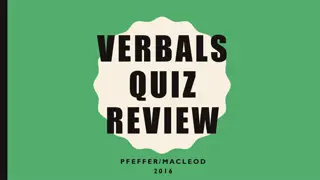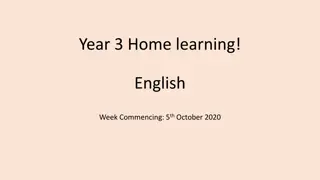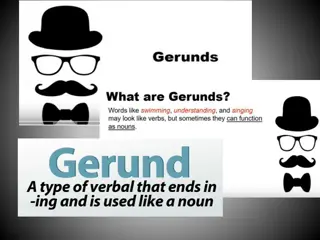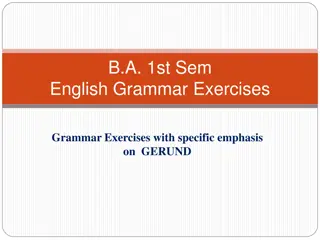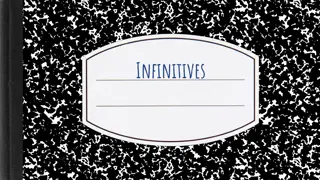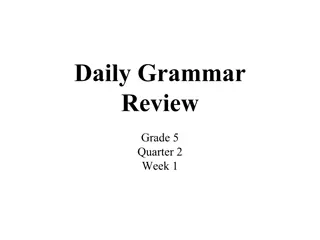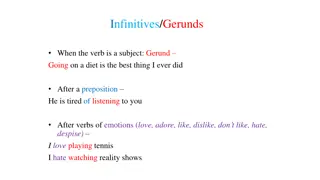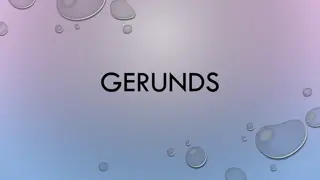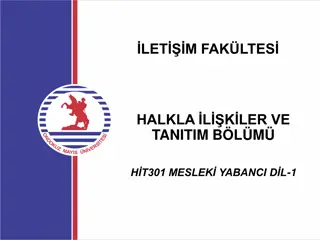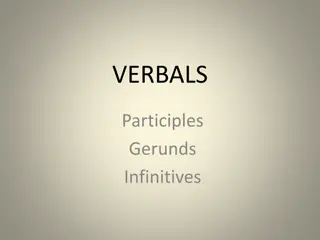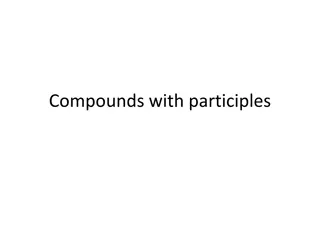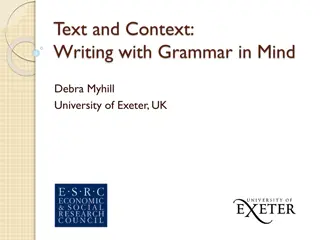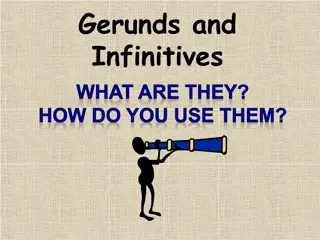
Verb Patterns: Gerunds and Infinitives in English Grammar
Learn about gerunds and infinitives in English grammar, including when to use each form after certain words, common verb patterns, and examples of gerund usage in sentences. Explore how gerunds and infinitives function as subjects, objects, and in various contexts within sentences.
Download Presentation

Please find below an Image/Link to download the presentation.
The content on the website is provided AS IS for your information and personal use only. It may not be sold, licensed, or shared on other websites without obtaining consent from the author. If you encounter any issues during the download, it is possible that the publisher has removed the file from their server.
You are allowed to download the files provided on this website for personal or commercial use, subject to the condition that they are used lawfully. All files are the property of their respective owners.
The content on the website is provided AS IS for your information and personal use only. It may not be sold, licensed, or shared on other websites without obtaining consent from the author.
E N D
Presentation Transcript
Gerunds and infinitives
Introduction Verb patterns in English grammar tell us whether to use the infinitive or the gerund after certain words. The infinitive is the basic form of the verb. Depending on the verb, adjective or noun it follows, we can use the infinitive with or without to e.g. (to) be, (to) have, (to) do. The infinitive without to is called the bare infinitive The gerund is the -ing form of a verb. It acts as a noun in a sentence and follows certain verbs, prepositions and adjectives.
Gerunds and infinitives Some verbs are followed by a gerund e.g., admit, imagine Some verbs are followed by an infinitive e.g., intend, learn Some verbs can be followed by either a gerund or an infinitive e.g., like, love, hate, prefer, continue, begin, start, can t stand A few verbs can be followed by either a gerund or an infinitive, but the meanings are different e.g., remember, stop
GERUND USE EXAMPLE as the subject of a sentence Cycling is good for your health. after certain prepositions Instead of studying for her exams, she went out every night. after certain adjectives with a preposition I am interested in visiting the museum. after certain nouns with or without a preposition There s no point in waiting any longer. after certain verbs with or without a preposition I enjoy cooking.
GERUNDS (verb + ing) We use them: After certain verbs - I enjoy singing. After prepositions - I drank a cup of coffee before leaving. A gerund is the only verb that can follow a preposition. As the subject or object of a sentence, to make general statements Meeting new people is fun.
Common verbs followed by the gerund: I enjoyed living in Italy. ENJOY FANCY DISCUSS I fancy seeing a movie tonight. We discussed going on holiday together. He dislikes waiting for buses. DISLIKE FINISH I've finished preparing for the meeting. I don't mind coming early. MIND SUGGEST He suggested staying at the Sheraton.
Common verbs followed by the gerund: She mentioned going to that college. MENTION He imagines working there one day. IMAGINE I tolerated her talking. TOLERATE I understand his quitting. UNDERSTAND The job involves travelling to Japan once a month. They completed renovating the house. INVOLVE COMPLETE He reported her stealing the money. REPORT I anticipated arriving late. ANTICIPATE Jane recalled using her credit card at the store. RECALL
Common verbs followed by the gerund: She recommended meeting earlier. RECOMMEND He kept working, although he felt ill. KEEP She avoided talking to her boss. AVOID She misses living near the beach. MISS I appreciated her helping me. APPRECIATE He delayed doing his taxes. DELAY He postponed returning to Rome. POSTPONE
Common verbs followed by the gerund: She practised singing the song. PRACTISE She considered moving to New York. He can't stand her smoking in the office. She can't help talking so loudly. CONSIDER CAN'T STAND CAN'T HELP He risked being caught. RISK He admitted cheating on the test. ADMIT He denied committing the crime. DENY
To infinitives We use 'to' + infinitive: After certain verbs - We decided to leave. After many adjectives - It's difficult to get up early. To show purpose - I came to London to study English.
Common verbs followed by to infinitive He demanded to speak to Mr. Pitt. DEMAND Frank offered to drive us to the supermarket. She waited to buy a movie ticket. OFFER WAIT I d hate to be late. / I d hate you to be late. WOULD HATE* I d love to come. / I d love him to come. WOULD LOVE* Nancy seemed to be disappointed. SEEM They expect to arrive early. / They expect Julie to arrive early. EXPECT We intend to visit you next spring. INTEND
Common verbs followed by to infinitive The child pretended to be a monster. PRETEND The guard refused to let them enter the building. He tends to be a little shy. REFUSE TEND I d prefer to do it. / I d prefer him to do it. WOULD PREFER He deserves to go to jail. DESERVE His health appeared to be better. APPEAR Anna arranged to stay with her cousin in Miami. I chose to help. ARRANGE CHOOSE
Common verbs followed by to infinitive She agreed to give a presentation at the meeting. AGREE I asked to leave early. / I asked him to leave early. ASK We decided to go out for dinner. DECIDE HELP He helped to clean the kitchen./ He helped his wife to clean the kitchen. She plans to buy a new flat next year. PLAN HOPE LEARN I hope to pass the exam. They are learning to sing.
Common verbs followed by to infinitive I want to come to the party. / I want him to come to the party. I would like to see her tonight. / I would like you to see her tonight. We promised not to be late. WANT WOULD LIKE PROMISE CAN AFFORD MANAGE We can t afford to go on holiday. He managed to open the door without the key. She claimed to be a princess. CLAIM PREPARE They prepared to take the test. / The teachers prepared the students to take the test.
Bare infinitive the infinitive without to' After modal verbs - I can meet you at six o clock. After 'let', 'make' and (sometimes) 'help' - The teacher let us leave early. After some verbs of perception (see, watch, hear, notice, feel, sense) - I watched her walk away. After expressions with 'why' - Why go out the night before an exam? ** help can also be followed by the infinitive without to with no difference in meaning: I helped to carry it = I helped carry it .
Infinitive or gerund - No Change in Meaning The following verbs can be followed by either the infinitive or the gerund without changing their meaning. Example: I started to read./I started reading. ATTEMPT BEGIN CONTINUE LOVE BOTHER HATE CANNOT BEAR CEASE INTEND PREFER
Infinitive or gerund - Change in Meaning The following verbs can be followed by either the infinitive or the gerund with a change in meaning. Example: I forgot to meet him. / I forgot meeting him. FORGET GO ON REMEMBER REGRET STOP MEAN TRY NEED
REMEMBER Remember + gerund Remember + to + infinitive I remember going to the beach when I was a child. (I have a memory of going to the beach). I remembered to buy milk. (I was walking home and the idea that I needed milk came into my head, so I bought some). He remembers closing the door. She remembered to send a card to her grandmother.
FORGET Forget + gerund Forget + to + infinitive Have we really studied this topic before? I forget reading about it. (NO RECOLLECTION!!!) I forgot to call my mother. She keeps forgetting to bring his book back. I told my brother that we d spent Christmas at Granny s house in 1985, but he d forgotten going there.
TRY Try + gerund Try + to + infinitive I tried to lift the suitcase, but it was too heavy. I wanted to stop smoking, so I tried using nicotine patches. (Using nicotine patches was easy, but I wanted to know if it would help me stop smoking). She tried giving up chocolate, but it didn t help her lose weight. (It was easy for her to give up chocolate. She gave it up to see if it would help her lose weight, but it didn t). She tried to catch the bus, but she couldn t run fast enough.
STOP Stop + gerund Stop + to + infinitive I stopped smoking. (I gave up cigarettes OR I threw away my cigarette at that moment). I stopped to smoke. (I stopped doing something else because I wanted to have a cigarette). My boss came into the room, so I stopped browsing the internet. I stopped to eat lunch. (I stopped something else, because I wanted to eat lunch).
REGRET Regret + to + infinitive Regret + gerund I regret going to bed so late. (I m really tired today.) I regret to tell you that the train has been delayed. She regrets leaving school when she was sixteen. (She wishes that she had studied more and then gone to university.) The company regrets to inform employees that the London office will close next year.
MEAN Mean + gerund Mean + to + infinitive I think Peter meant to break that glass. It didn t look like an accident. (Intention!) I m applying for a visa. It means filling in this form. (One thing resulting in another) I meant to go running, but I got up too late. I'll have to catch the 7 am train to Nottingham, which means getting up at 5 am.
GO ON Go on + gerund Go on + to + infinitive The teacher introduced herself and went on to explain everything about the course. (do something else, the next thing) The teacher told everyone to be quiet, but they just went on talking. (continue doing something) Mark went on studying through the night. After her early teaching career she went on to become a doctor.
Useful online practice Infinitive/Gerund Free Exercise (lingolia.com) Exercise on Infinitive and Gerund - 30 - English Grammar (ego4u.com) https://test-english.com/grammar-points/b1/gerund-or-infinitive- do-to-do-doing/ https://test-english.com/grammar-points/b1-b2/gerund-or- infinitive/ https://test-english.com/grammar-points/b2/verb-object- infinitive-gerund/




